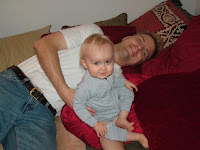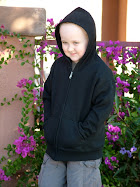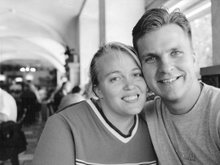 This morning we met with Diane, the transplant coordinator, and Dr. Karrer, the transplant surgeon. We basically went through a preliminary transplant evaluation meeting. A formal transplant evaluation usually takes a whole day, and we would meet the whole team involved in Julian’s operation. Most of those formalities can take place at a later time: today was just about going over the process whereby Julian will receive his new kidney.
This morning we met with Diane, the transplant coordinator, and Dr. Karrer, the transplant surgeon. We basically went through a preliminary transplant evaluation meeting. A formal transplant evaluation usually takes a whole day, and we would meet the whole team involved in Julian’s operation. Most of those formalities can take place at a later time: today was just about going over the process whereby Julian will receive his new kidney. There’s a lot of information to process, and I won’t (can’t?) repeat it all here. They gave us a 6 lb. binder full of information, from team member contact info, to the step-by-step process leading up to the actual surgery, to the medications involved in Julian’s after-care, to the risks involved at every step. We’ll be experts by the time the surgery actually takes place.
Some of the things we’ll be doing that we would appreciate your prayer for are:
- Dealing with the insurance company – a transplant is a major deal in the insurance world, and we want to make sure it’s handled appropriately by all parties;
- Major and minor preparations leading up to the surgery – Julian’s labs, ekg’s, x-ray’s, and overall health, our family psych eval (!), and our own health and well being, along with a hundred things I can’t even think of right now – all very important;
- An appropriate organ match – neither Stacy nor I are good matches for Julian – Stacy’s type ‘B’, I’m type ‘A’, and Julian is type ‘O’.
The match is probably the biggest thing for us in the immediate future: as a type ‘O’, Julian is the universal donor, but he is the hardest to find a match for when it comes to receiving a donated organ. None of Julian’s living relatives have type ‘O’ blood that we’re aware of, so we’ll be put on the list for a cadaveric donor. The donor’s blood type pretty much has to be type ‘O’ in order for it to be viable. After that, there are several other comparative markers the surgeons will be looking for, to ensure compatibility and reduce risk of rejection. Lining up all the factors seems pretty daunting, and we’ve heard the wait can be anywhere from days to years. We’re hoping for days.
Should the wait be too long, and if Julian’s kidney function declines further, we’ll probably have to put him on dialysis in the interim. We’d like very much to avoid that. As such, we’re praying for a quick evaluation/preparation period, followed by a short wait for an organ. Please pray with us that this comes to pass.
 After the actual transplant takes place, there will be a whole new set of prayer requests, as receiving a donated organ of any kind makes a person susceptible to any number of other possible ailments. That thought can be paralyzing to us as parents – do we really want to subject him to all that risk? But weighing all the options, we still feel that the transplant is still the best course of action. God has brought him this far. We’re confident that God will bring him through this as well.
After the actual transplant takes place, there will be a whole new set of prayer requests, as receiving a donated organ of any kind makes a person susceptible to any number of other possible ailments. That thought can be paralyzing to us as parents – do we really want to subject him to all that risk? But weighing all the options, we still feel that the transplant is still the best course of action. God has brought him this far. We’re confident that God will bring him through this as well.







